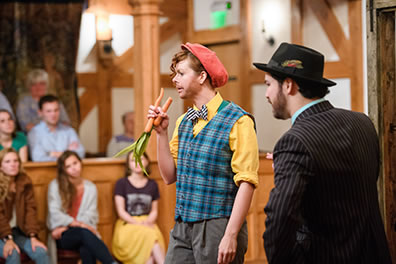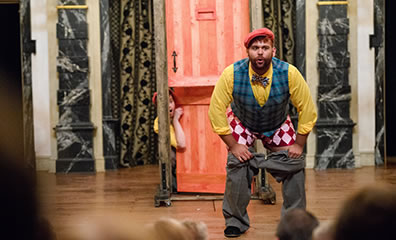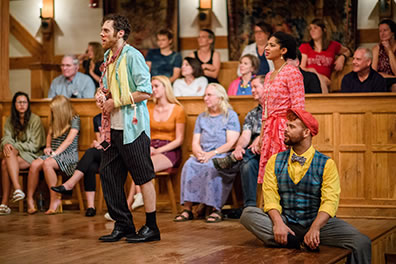The Comedy of Errors
A Play to Take Your Breath Away
American Shakespeare Center, Blackfriars Playhouse, Staunton, Virginia
Sunday, May 12, 2019, C–6&7 (center stalls)
Directed by Desdemona Chiang

Dromio of Syracuse (Annabelle Rollison, left) channels his inner Bugs Bunny as his master, Antipholus of Syracuse (Andrew Tung) talks to him in the American Shakespeare Center's production of William Shakespeare's The Comedy of Errors at the Blackfriars Playhouse. Photo by Marek K Photography, American Shakespeare Center.
Topher Embrey is panting as he walks on to the Blackfriars Playhouse stage in Staunton, Virginia, during intermission. The American Shakespeare Center's tour troupe is performing music during the break in the play as patrons line up at the bar cart on stage, mill about the playhouse, or rock out with these top-tier musicians. The players have just finished The Clash's "Should I Stay or Should I Go" and will next perform a medley of Queen's "Fat Bottomed Girls" and Sir Mix a Lot's "Baby Got Back (I Like Big Butts)," all acoustically (as the world's only re-creation of William Shakespeare's indoor theater; the Blackfriars doesn't use electronic or digital effects, even for its preshow and intermission music). Embry is the preshow and intermission emcee.
"Whoa!" he gasps, catching his breath. "People ask me, Topher, do you work out? No, I do Comedy of Errors." Like all good comedy, this joke is based on truth. Embry is playing Dromio of Ephesus in this American Shakespeare Center production of William Shakespeare's early comedy, and both he and his counterpart twin, Annabelle Rollison as Dromio of Syracuse, are getting an aerobic workout with this show.
In fact, the entire cast engages in the production's frantic physicality, scoring a triple crown of artistic triumphs on this Mother's Day weekend of Shakespeare and semi-Shakespeare theater at the Blackfriars Playhouse. After a Saturday doubleheader featuring an elegiac, meditative production of Shakespeare's The Winter's Tale and a sharply delivered world premiere of Mary Elizabeth Hamilton's 16 Winters, or The Bear's Tale (the second outing in the company's Shakespeare's New Contemporaries series of plays), these actors show their slapstick comedy bona fides with a delightful romp through The Comedy of Errors. Sophocles' Antigone (which we didn't see) is also part of this Blackfriars spring season repertory featuring the American Shakespeare Center's touring players at the conclusion of their six-month, 14-state, 28-city Hand of Time Tour.
This is a heckuva talented troupe of actors: talented in verse-speaking skills, character-development intelligence, physical capacities, musicianship, and handling of Shakespeare's original staging conditions, which, in addition to no electronic or digital effects, includes universal lighting, no sets and few props, and audience members in close proximity, including some sitting on "gallant stools" right on the stage. The majority of Shakespeare's lines this weekend are spoken directly to people in the audience, giving the lines deeper reverberations, whether dramatic or comic. Antipholus of Syracuse (Andrew Tung), already sensing something's weird about Ephesus where he and his Dromio have just landed, recalls how "They say this town is full of cozenage," including "disguised cheaters, prating mountebanks, and many such-like liberties of sin"; he is pointing with a suspicious stare directly at one of the gallants. Embrey's Dromio of Ephesus would later take refuge from the mounting mayhem on a gallant's lap. Some such interchanges are unplanned. Josh Clark as Antipholus of Ephesus describes how he was bound in ropes by one Pinch, "Till, gnawing with my teeth my bonds in sunder." A woman in the audience cries out "Oh!" and Clark replies to her, "I know!"
Desdemona Chiang, a veteran director at major West Coast Shakespeare theaters from Seattle through Oregon to San Francisco, helmed this Comedy of Errors. She calls the piece "one of Shakespeare's most technically demanding plays, full of slapstick and extraordinary physical feats," but she turns the focus of her program notes on the play as an "existential crisis." Noting that the two sets of twins have nothing to distinguish their identities except their geographical origins, "For an American audience largely preoccupied with individualism and our own sense of self-importance, this idea can be a bit distressing," Chiang writes. "Sort of like a nightmare where you're slowly finding that you're living a life that doesn't seem to be yours."
Insightful as Chiang's treatise is, I worried that we were in for a psychologically heavy-handed rendering of the play. The opening scene points in that direction—brilliantly. Egeon (Michael Hahalyak) recounts his life story to the Duke of Syracuse (Kenn Hopkins Jr.): how he married Emilia; how, while accompanying him on one of his business trips, she gave birth to identical twins in an inn where a poor woman also gave birth to identical twins, whom Egeon bought as servants to his boys; how the family, heading for home, was separated in a shipwreck, mom and one set of twins picked up by one ship, dad and the other set of twins picked up by a different ship; how the son and his servant with Egeon reached their majority and departed to seek out their brothers; how Egeon a few years later set off to find them and has landed in Ephesus where, it turns out, people of Syracuse are outlawed and Egeon is sentenced to execution if he cannot raise bail. This tale runs more than 100 lines of text, so directors tend to add some excess stage business to keep the audience's attention. Chiang does not: Hahalyak's Egeon stands to one side at the front of the stage, speaking; Hopkins' Duke stands at the back of the stage, listening. Yet the scene is riveting from start to end. Describing how the family was fastened at either end of a mast and heading toward the two approaching ships, Egeon suddenly cuts off his tale. "But ere they came," he says of the ships, and Shakespeare inserts a dash for pause. Hahalyak uses that dash to show us a chasm of despair: "O, let me say no more!" Nay, forward, old man.
Egeon's tale finished and the Duke giving him a day's reprieve as a show of mercy, the next scene introduces the set of Syracusian twins, who also have just put into Ephesus. Jessica Van Essen's costume designs give this production a mid-20th century southern European feel, the women in dresses coming just below the knees, the men in three-piece striped suits, the Dromio's in classic paperboy vests and dog caps, and all in bright Mediterranean hues. The setting invites regendering roles, so Ally Farzetta plays the First Merchant as a woman, welcoming Antipholus and Dromio (whom Rollison plays as a man) to Ephesus and warning the two about the local edict against Syracusians. Antipholus hits on her with his invitation to "walk with me about the town, and then go to my inn and dine with me." She has business at hand, she says, but, "Soon at five o'clock, please you, I'll meet with you upon the mart and afterward consort you till bed-time." She gives this line a flirtatious edge, but her parting line, "Sir, I commend you to your own content," enigmatically suggests that she might not consort with him after bed-time. This reading is exemplary of the intelligent freshness this cast imbues the text withal.
"She that commends me to mine own content commends me to the thing I cannot get," Antipholus says, slipping into his soliloquy meditating on how searching for his brother is like two drops in the ocean trying to find each other. Chiang highlights this passage in her program notes. "The Comedy of Errors is a story of the search for the whole, that in searching for your other, you come closer to finding yourself, and in doing so, lose yourself to something greater."
The something greater we almost immediately lose ourselves to is a Loony Tunes cartoon, the genius of Shakespeare channeled through the genius of Chuck Jones. Rollison's carrot-eating Dromio even makes a visual reference to Bugs Bunny as she switches from a nearly eaten carrot to a new carrot. The chase scene heading into the play's final act features characters running in and out of the three doors on the stage, a staple schtick in many a Warner Brothers cartoon. The violence, though, is less Acme-manufactured and more Three Stooges, albeit literary minded. Tung's Antipholus of Syracuse, mistaking Embry's Dromio of Ephesus for his Dromio, punishes the servant by dragging him about by the ears. Thus, Dromio reports to his mistress, Adriana (wife of Antipholus of Ephesus), "He's at two hands with me, and that my two ears can witness."
Constance Swain plays the put-upon Adriana with a steely edge, a Tasmanian Devil who shows brief moments of placation. As her sister Luciana (Madeline Calais) preaches patience and appeasement, Swain's Adriana stares straight ahead, seething with disdain for her sister's ignorance. When Luciana questions why Adriana would be so jealous of one she professes to hate, Swain's Adrian turns her disdain on herself as she replies, "Ah, but I think him better than I say." Her intense pride does not relieve her of slapstick duties in this production; when she begs justice of the Duke in the climactic final scene, Swain dives into a slide across the stage, ending stretched out face-down on the floor in supplication at the Duke's toes.
Attending the two ladies is Luce (Hopkins), in this staging a tuxedoed butler working with dignified formality. This depiction of Luce is an unusual choice: in the text, the character appears only as a voice "within" during the gate confrontation scene, and many productions combine the character with Nell, the kitchen wench betrothed to Dromio of Ephesus and bedeviling Dromio of Syracuse. Chiang's unusual choice creates great comic potential, Luce standing as a beacon of civility and society amid the maelstrom of violence and emotions swirling about him—even when he's delivering his lines at the gate.


Top, Dromio of Ephesus (Topher Embrey) sends a message to Dromio of Syracuse (Annabelle Rollison) at Antipholus's gate. Above, a bedraggled Antipholus of Ephesus (Josh Clark), his wife Adriana (Constance Swain), and his servant Dromio address the Duke in the climactic scene of The Comedy of Errors. Photos by Marek K Photography, American Shakespeare Center.
The gate scene, centerpiece of the play's first half as Adriana has dragged the Syracusian twins to her home and the Ephesian Antipholus and Dromio show up with friends for lunch to find the gate locked against them, is brilliant in its simple staging. A door on casters serves as the gate, and it is turned 90 degrees at points during the scene so we get the confrontations from all angles.
Even with all the physicality, this production shines most in the lines, which the cast delivers so expertly, especially Clark in his third year with the touring troupe. After his arrest at the suit of the goldsmith and sending the wrong Dromio to fetch bail money from home, Clark's Antipholus tells the officer he's not sure of his servant's success. "My wife is in a wayward mood to-day," he understates, earning a big laugh. Later, when he makes his case to the Duke, Antipholus of Ephesus refers to Adrianna as "This woman"; Clark inserts a significant pause between the two words, rolodexing through several terms before deciding on woman.
Casting two pairs of lookalikes is well-nigh impossible in an 11-member troupe, so the production runs in the opposite direction: its Dromios and Antipholi aren't even remotely similar physically: Rollison, a white-skinned woman of slight build as Dromio of Syracuse, versus Embrey, a man of color with bulk in his build as Dromio of Ephesus. His beard is real, hers is makeup. Tung and Clark don't look much alike as the two Antipholi, either, and this fact contributes to one of the best sight gags of the show, when Adriana holds up a portrait of her husband: it's a photograph of Clark (who plays her espoused Antipholus), but when she flips it over, the image is of Tung. Both Antophili wear identical three-piece black pinstripe suits with turquoise shirts and pink paisley neckties, and both enter the play's second half with black eyes. The outfits on the two Dromios are identical, too, down to their red-diamond boxer shorts that come into play in the gate scene.
Despite obvious physical differences, the confusions not only work on the stage, they work on us. When Dromio of Ephesus, upon Antipholus of Ephesus's orders, brings in the rope instead of the money that the now-arrested Antipholus of Ephesus had sent Dromio of Syracuse to fetch, the moment garners the day's biggest laugh. Thanks to the production's pace, we lose track of who is who.
Amid the lunacy, the play's heart still beats loud; indeed, louder than in most productions of The Comedy of Errors I've seen. Clark's Antipholus even shows some remorse for the beatings his Dromio has suffered at his hands and, despite his own heightened aggravation, begins to show his servant pity and care. The climactic reunion of father to sons and brothers to brothers, all compounded by the revelation that Emilia is also already on the stage, generates gasps of wonder in the audience. When it comes to climactic gotchas on the audience of the joyful variety, Shakespeare wouldn't top this one until more than 15 years and 27 plays later with The Winter's Tale. This troupe nails these breathtaking moments in both plays.
Eric Minton
June 8, 2019
Comment: e-mail editorial@shakespeareances.com
Start a discussion in the Bardroom



 Find additional Shakespeareances
Find additional Shakespeareances